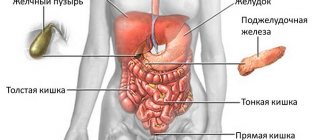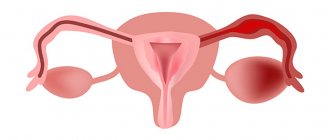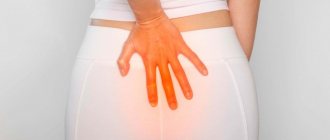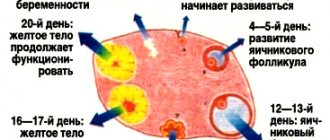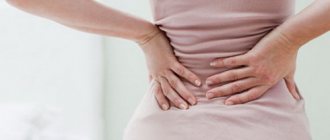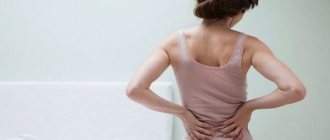The female genitourinary system has a delicate organization, so the slightest changes in hormonal levels affect the condition and functioning of all organs and life support systems. The change in the monthly menstrual cycle occurs with a certain frequency and is accompanied by a set of specific symptoms that manifest themselves purely individually. Many people do not have them at all, but some women complain that their kidneys hurt during menstruation and there is heaviness in the lumbar region. It is possible to identify the true cause of this disorder and undergo adequate treatment only through the qualified assistance of a specialist.
What to do if pain occurs
It is imperative to go for a consultation with a gynecologist.
Remember when it all started, with what symptoms. Pay attention to vaginal discharge. Uncharacteristic consistency, unpleasant odor, an increase in their number, as well as bleeding during menstruation are a symptom of a sexually transmitted disease
In the absence of pathologies in the sexual sphere, the problem should be sought in the functioning of the kidneys.
If going to the gynecologist is not possible, you need to relieve the pain, you can use the following pills:
- Analgin;
- Spazmolgon;
- No-shpa;
- Ketones;
- Ketolong.
Medicines relieve pain, but do not eliminate the cause. Complete treatment with anti-inflammatory, antibacterial, antimicrobial and other agents is prescribed by a specialist. Self-therapy is unacceptable. Antibiotics are taken only as prescribed by a doctor after receiving test results. Incorrect prescription can aggravate the situation and provoke the growth of pathogenic cells.
Treatment of kidney pain during menstruation
It is necessary to deal with the problem only when the cause of the discomfort is precisely established. Otherwise, you may not help, but harm the body. To solve problems with organs, the patient is prescribed a diet, getting rid of bad habits, home methods and medications to relieve pain.
Diet
It is useful to include the following foods in your diet:
- watermelon, melon, pumpkin - have a diuretic effect, so I will support kidney function, especially before and during menstruation;
- you should limit or better yet abstain from alcohol altogether;
- It is useful to drink decoctions of berries and herbs, cranberry juice, jelly, compotes;
- preference should be given to stewing and steaming;
- you need to eat a lot of fruits and vegetables;
- Dairy products are healthy.
General recommendations
A healthy lifestyle and getting rid of bad habits, of course, will not help get rid of serious diseases, but they will help minimize complications and the likelihood of repeated exacerbations. The following is recommended:
- regularly take walks in the fresh air, especially useful before bedtime;
- engage in any type of physical exercise two to three times a week;
- you should stop drinking alcohol and smoking (including hookah, electronic cigarettes);
- Various types of massage will be useful;
- Equally important are healthy sleep and the ability to correctly perceive stressful situations.
Pain relief
For this purpose, medications can be used if the pain is severe or does not go away for a long time. You can also use other means, for example:
- take a hot bath, alternatively a bottle of warm water or a woolen scarf on the lumbar area;
- massage and acupuncture will also help relax muscles and improve the functioning of the nervous system;
- relaxing physical exercises (Pilates, bodyflex, yoga), but they are effective when performed regularly.
If the pain increases or persists for a long time, you should consult a doctor. Taking any painkillers can blur the clinical picture and complicate diagnosis. If this is not possible, you can take:
- antispasmodics – Drotaverine, Papaverine, No-shpa;
- painkillers and anti-inflammatory - Ketorolac, Ketonov, Dicloberl.
Directions of therapy
Treatment depends on the underlying cause of the pain and may be as follows:
- anti-inflammatory – for infections in the kidneys and other parts of the urinary system;
- immunocorrective – for chronic diseases;
- pain reliever - in the acute period, when there is constant discomfort;
- hormonal – if the cause lies in diseases of the reproductive system.
The general algorithm of actions for pain will be as follows:
- make an appointment with a doctor or go without prior registration if the pain is severe;
- do an ultrasound of the internal organs and retroperitoneal space;
- take blood and urine tests, smears from the vagina and cervix to exclude the inflammatory nature of the pain;
- take painkillers or antispasmodics according to the instructions;
- You can complement the effect of a hot bath.
Actions
If kidney pain occurs during menstruation, you should:
- go to the doctor and undergo an examination to identify the causes and explain the nature of the pain;
- do an ultrasound;
- take blood, urine and vaginal smear tests to diagnose inflammatory processes;
- to relieve acute pain, you can use analgesics such as No-shpa or Spazmalgon;
- To reduce pain, it is recommended to take a warm bath.
Nutrition rules
A woman’s diet plays an important role in the presence of kidney pain during menstruation. In case of exacerbation of diseases during menstruation, it is necessary to adhere to a special diet:
- It is useful to eat foods with a mild diuretic effect, such as watermelons, melons, and pumpkins.
- To avoid increasing pain, you should avoid alcohol. Berry fruit drinks, compotes and jelly are useful for quenching thirst.
- It is also useful for kidney pain to eat boiled or stewed meat and eggs. It is advisable to eat fresh vegetables and fruits and drink milk.
- Salted, fried and smoked foods can put more stress on the kidneys and lead to even more pain. Therefore you need to avoid it.
Useful tips
To relieve menstrual pain, which can cause kidney pain, it is recommended to use the following remedies:
- You should take a relaxing bath, listen to pleasant music and try to escape from your problems and worries.
- Giving up bad habits significantly reduces pain and promotes the proper functioning of the whole body.
- Although it is generally accepted that physical activity during menstruation can lead to increased pain, bodyflex and yoga classes will not harm, but on the contrary, will help tune the female body to a healthy wave.
- Any hypothermia can cause inflammatory processes in the body; against the background of reduced immunity, it can become destructive.
- For spasms and mild pain (if the cause is identified), heat can be used. As such, you can use a bottle filled with warm water. The heating pad must be placed on the stomach. Bend your knees into a fetal position. This method helps increase blood flow and reduce painful spasms.
- Walking outdoors is beneficial for everyone. Saturating the blood with oxygen can reduce pain and improve well-being.
- Massage and acupuncture for pain relief are effective, affordable and widespread today. If you are unable to attend a session with a specialist, you can use the Kuznetsov applicator and conduct a self-massage session. The applicator should be placed under the lumbar area and lie on it for 10-15 minutes.
- Compliance with the work and rest schedule is a very important process for any person, for women in particular. Inadequate sleep, hard work and constant fatigue exhaust the female body and reduce the resistance of the immune system.
Unpleasant sensations in the back and kidney area during menstruation can be caused by a number of reasons. In any case, if any unpleasant symptoms appear, it is better to consult a doctor for diagnosis and timely treatment.
Source of the article: https://nefrox.ru/symp/bolyat-pochki-pri-mesyachnyh.html
Why do your kidneys hurt before your period?
The female genitourinary system has a delicate organization, so the slightest changes in hormonal levels affect the condition and functioning of all organs and life support systems.
The change in the monthly menstrual cycle occurs with a certain frequency and is accompanied by a set of specific symptoms that manifest themselves purely individually. Many people do not have them at all, but some women complain that their kidneys hurt during menstruation and there is heaviness in the lumbar region.
It is possible to identify the true cause of this disorder and undergo adequate treatment only through the qualified assistance of a specialist.
Relationship with the reproductive system and menstruation
Kidneys are one of the important organs in the body; the condition of the body and the female reproductive system depends on its functioning. The kidney organs perform important functions:
- promote the production of the hormones renin (responsible for water metabolism and blood circulation), erythropoietin (promotes the production of red blood cells) and prostaglandins (provides normal blood pressure). Hormones affect the menstrual cycle, menstrual periods depend on the functioning of the organs;
- cleanse the blood of harmful substances (waste, toxins);
- transform one substance into another;
- control the acid-base balance, thanks to this the equality of substances in the blood plasma is maintained.
The activity of the reproductive system and the menstrual cycle depend on hormonal levels. And as was said, the kidneys contribute to the production of hormones and have other functions on which the hormonal composition of the reproductive system depends. The kidneys are interconnected with the reproductive system and the process of menstruation. And when any problems or disturbances arise in the urinary system, this is reflected in the critical days.
Kidney diseases
The kidneys are pulled most often with the development of various inflammatory processes, for example, with pyelonephritis or glomerulonephritis. The cause of discomfort can be kidney disease in acute or chronic form.
Pyelonephritis
This is an infectious disease that affects the kidney calyces and pelvis. Often a consequence of a cold. If the kidney is pulled on the right, this means that the infection is localized in this area. If on the left, the left kidney is affected.
The causative agents of infection are pathogenic bacteria. They actively multiply and damage kidney tissue. A person experiences pain in the kidney area and his temperature rises. The next stage of the disease is intoxication.
Pyelonephritis is characterized by moderate pain, but it is constant. If the disease is caused by the presence of stones, the pain is severe and comes in attacks.
Glomerulonephritis
This is an autoimmune lesion of the kidney tissues, with an acute course. Both kidneys hurt. The disease often manifests itself 2-3 weeks after a sore throat due to a streptococcal infection.
Nephroptosis
Prolapse of the kidney, or nephroptosis, also gives symptoms of heaviness and nagging pain. The prolapsed kidney takes on an unnatural position, causing the ureter to bend. Then the process of urine excretion is disrupted.
There are many reasons for the occurrence of pathology:
- congenital anatomical anomalies;
- sudden weight loss;
- physical stress;
- injuries;
- pregnancy.
Over a long period of time, nephroptosis can provoke another kidney disease – hydronephrosis.
Hydronephrosis
https://youtube.com/watch?v=QsDmlPcpB18
Hydronephrosis of the kidney is often diagnosed with pathological enlargement of the kidney. The pathology develops due to a violation of the outflow of urine.
The liquid puts a lot of pressure on the pelvis and cups, they expand, and the wall tissue inevitably stretches and thins. An environment favorable for the development of inflammatory processes is created in the organ. Causes of the disease:
It is believed that the right kidney is more susceptible to damage; pathology is more often observed in women.
Urolithiasis disease
Urolithiasis (urolithiasis) can provoke an attack of acute pain. Insoluble sediment forms and settles in the urinary tract, eventually turning into stones. When moving, the stones cause unbearable pain.
If stones appear, other consequences are inevitable:
- damage to the mucous membrane of the urinary organs;
- disruption of urine outflow and further increase in pressure in the pelvis;
- inflammation of the pelvis or ureter;
- ureteral spasm.
Renal colic brings unbearable pain, both nagging and sharp. It's not easy to get rid of it.
Other pathologies
Sometimes the reason why kidney pain is caused by pathologies of other organs. Often heaviness and pain in the kidney area is caused by osteochondrosis and scoliosis. If a person has diseases of the spine, the feeling that the back is being pulled in the area of the kidneys occurs quite often. Their cause is overstrain of the back muscles.
If the left kidney is pulled, the cause may be inflammation of the intestines. Pulling sensations often cause liver diseases.
Causes of pain
The first to feel pain in the kidneys are representatives of chronic kidney diseases. Diseases can provoke a complete absence or, conversely, heavy periods. On critical days, blood flow and the number of microorganisms transmitted through blood increase. This loads the capacity of the kidneys, they have to work harder, and therefore pain appears in kidneys susceptible to such chronic diseases as pyelonephritis, pyelitis, and urolithiasis.
In inflammatory diseases of other organs, the infection primarily enters the kidneys, thereby increasing the load on their work. And menstruation puts additional stress on the kidneys, which affects their function. A number of sexually transmitted diseases and inflammation in the genitourinary system also cause pain accompanied by discharge. If these symptoms occur, you should immediately consult a doctor.
With endometriosis, the uterus increases in size, and during menstruation it can put pressure on the kidneys, causing pain. Bend or underdevelopment of the uterus can put pressure on the nerve endings and cause pain that is mistaken for kidney pain. Inflammation of the lower back muscles in diseases of the spine and joints caused by injuries or stress sometimes provoke pain in the kidneys.
During critical days, the uterus begins to move and touches neighboring organs. Also, a number of medications that remove toxins cause pain. The reason may not be related to any disease, such as poor diet, for example, drinking alcohol, coffee, spicy foods, which increase the load on the kidneys.
Some kidney problems can be passed on genetically. When the kidneys hurt before the onset of menstruation, this may be the cause of adhesions or cysts. If the painful sensations continue even after the end of menstruation, then hormones are not the only culprit. This is probably an infectious disease plus decreased immunity and poor hygiene.
Before menstruation, women’s kidneys begin to hurt: what’s the matter?
Menstruation in the fairer sex is a genetically determined process, the normal course of which is determined by the influence of sex hormones - estrogen and progesterone. Since the functioning of all body systems is interconnected, it is likely that women often experience kidney pain during menstruation.
The relationship between the menstrual cycle and kidney function
Kidneys are the most important component of the human body, and their coordinated work ensures the normal functioning of all systems, and especially the reproductive one. To understand the mechanism of interaction, and to understand why the kidneys hurt before, during, and after menstruation, you should study in detail the main functions of the paired organ.
- Cleansing the blood of waste and toxins, end products of metabolism.
- Participation in the transformation of one substance into another.
- Performing the function of excreting urine.
- Monitoring the level of acid-base and water-electrolyte balance, blood composition.
- Participation in the production of hormones - renin, erythropoietin, and prostaglandins, which are responsible for water metabolism and blood circulation, the production of red blood cells and the normalization of blood pressure.
Since the kidneys are directly involved in the synthesis of hormones, and the reproductive system is completely subordinate to their level, it is quite natural that any pathological changes in the urinary structures affect menstruation. In addition, during this period the body loses a certain amount of blood, which makes it especially vulnerable to the penetration of various types of infections and exacerbation of chronic diseases.
Causes of pain in the kidneys on the eve of menstruation
Normally, menstruation should not be accompanied by any discomfort or pain. But for some teenagers, girls and women, this is nonsense, and they often prepare in advance for the approach of this moment. Unpleasant sensations may occur if there are any violations:
- inflammatory processes in the urinary system;
- infectious diseases of the pelvic organs;
- kidney pathologies.
Pathologies
Since most patients complain about unpleasant and painful sensations before menstruation, doctors have identified a number of reasons that provoke the occurrence of these conditions. Conventionally, they can be divided into several groups.
Diseases of the uterus and appendages, both inflammatory and other origin. These include salpingitis, adnexitis, endometriosis. In addition to specific symptoms, each of them is characterized by radiating “renal” pain. It may also be a consequence of the formation of adhesions in the abdominal cavity.
Disorders of the musculoskeletal system and muscle structures. Osteochondrosis, scoliosis, spinal hernia, overstrain of the lumbar muscles lead to pain in the lumbosacral region and the kidney area.
Changes in the topography of the uterus. With a significant posterior deviation of the reproductive organ, mechanical compression of the nerve endings of the parietal peritoneum occurs, which leads to the formation of a pain syndrome, which is regarded as renal.
Diseases of the female urinary tract, including sexually transmitted infections. Ascending inflammatory processes that develop against the background of insufficient hygiene or specific pathologies caused by pathogenic microflora are considered a common cause of “kidney pain.” They can be easily identified by the presence of discharge of a characteristic color with an unpleasant odor and difficulty urinating.
Pyelonephritis, urolithiasis, pyelitis. Diseases that tend to worsen during the premenstrual period against the background of weakened immunity and hyperactivity of the uterus. They are also characterized by pain in the kidneys.
The functionality of the reproductive organ and the intensity of pain are directly dependent on changes in hormonal levels. If during menstruation, in addition to “renal syndrome,” nausea, weight loss, anxiety, and insomnia are noted, this indicates endocrine disorders, and consultation with a specialized specialist is necessary.
Other explanations
Often, in the absence of any pathologies, a woman is able to feel pain in the kidneys during menstruation. Doctors point to the following possible causes
- Poor nutrition. Eating spicy, salty foods, fried and fatty foods, alcohol, and strong drinks increases the load on the paired organ.
- Medications. Long-term use of certain groups of drugs negatively affects the functioning of the excretory system.
- Hormonal drugs. Birth control pills increase the load on the liver, kidneys, and gastrointestinal tract. Choosing a different means of contraception will help change the situation.
As you can see, pain in the lower back can occur for fairly simple reasons. They can be easily eliminated at home and do not require special treatment.
Associated symptoms
As critical days approach, most women prepare for increased discomfort, a feeling of heaviness and nagging pain in the lower back. But not many of them know how to recognize that their kidneys hurt before menstruation. In this case, it is advisable to take the advice of specialists and pay attention to the following symptoms.
- Pain. As a rule, it is localized in the lumbar area - in the center, right or left. It is dull, aching and monotonous in nature, and the intensity may increase or remain mild. With severe lesions, an acute unbearable feeling occurs, which is noted on one side.
- Urine. The amount of urine excreted in a healthy adult woman ranges from 700 ml to 2 liters. An increase to 2.5 liters may indicate renal disorders during menstruation. The nature of urine changes - it becomes colorless and has no specific odor. A reduction in the daily volume of urine excreted to 500 ml is also considered an alarming indicator.
- Feeling thirsty. The body experiences a lack of fluid due to its active elimination, so it strives to fulfill the irresistible desire to drink water.
- Change in blood pressure. Due to developing pathologies, the kidneys stop producing renin in normal quantities. A deficiency or excess of this hormone provokes fluctuations in blood pressure.
Causes of pain
Basically, pain warns of some problem with the body. It could be:
- infection in the genitourinary tract;
- inflammation of the uterus;
- infertility;
- the presence of contraceptives inside the uterus;
- ectopic pregnancy;
- menstrual irregularities.
If the balance of progesterone in the female body is disturbed and prostaglandins accumulate, this can also cause pain. Such substances play a big role in the appearance of discomfort during menstrual periods.
Frequent discomfort in the lumbar region before menstruation indicates an imbalance in the water balance in the body. When fluid does not leave the body in a certain amount, edema may occur.
Why else can pain occur during menstruation? If, during discomfort in the lumbar region, various other symptoms appear, for example, nausea, disturbed sleep, weight loss, then you should definitely be examined by an endocrinologist. In these cases, the functions of the thyroid gland may be impaired, because the production of hormones is completely under its control.
When such substances are produced in the tissues of the uterus, its contraction is stimulated. If there are a lot of prostaglandins in the body, the uterus will contract more and pain syndromes will be more pronounced.
Kidneys hurt during menstruation due to hormonal changes. There is not a single internal organ that continues to function normally on the eve of menstruation. However, severe pain is present in the lower abdomen and lower back. All other painful sensations are not characteristic of premenstrual syndrome; they need to be dealt with.
Inflammatory diseases of various origins in the genital organs - endometritis, vaginitis, oophoritis - provoke increased filtration, since it all begins with infection. The kidneys try to get rid of harmful microorganisms, they work in an intensive mode, the additional load during menstruation completely disables the kidneys.
On the eve of menstruation, the uterus increases in size due to the growth of the endometrium, blood flow, and puts pressure on neighboring organs. The kidneys become compressed, which often causes severe pain. Diseases of the uterus and appendages - hyperplasia, endometriosis - significantly aggravate the situation.
Sexually transmitted diseases occur without obvious symptoms for a long time. Meanwhile, the kidneys are already beginning active work to cleanse the blood. With the onset of menstruation, the situation becomes clearer, as painful urination, discharge from the genitals and other characteristic symptoms are added.
Medications can cause pain in the kidneys during menstruation. Since this organ cleanses the blood of waste products and removes toxins.
- Poor nutrition. Alcoholic drinks, coffee, salty, spicy, fatty, fried foods strain the kidneys and disrupt their functions.
- Medications. Try not to take medications unless absolutely necessary.
- Hormonal pills. Contraceptives in the form of pills burden the liver, gastrointestinal tract, and kidneys. To get rid of painful manifestations, it is enough to change the contraceptive method.
These causes of kidney pain are easily eliminated and do not require special treatment.
If diseases of the kidneys, urinary system and genital organs are not detected, then you can only understand why your kidneys hurt during menstruation by analyzing your lifestyle.
The first to feel pain in the kidneys are representatives of chronic kidney diseases. Diseases can provoke a complete absence or, conversely, heavy periods.
On critical days, blood flow and the number of microorganisms transmitted through blood increase. This loads the capacity of the kidneys, they have to work harder, and therefore pain appears in kidneys susceptible to such chronic diseases as pyelonephritis, pyelitis, and urolithiasis.
In inflammatory diseases of other organs, the infection primarily enters the kidneys, thereby increasing the load on their work. And menstruation puts additional stress on the kidneys, which affects their function. A number of sexually transmitted diseases and inflammation in the genitourinary system also cause pain accompanied by discharge. If these symptoms occur, you should immediately consult a doctor.
Kidney function and menstruation
Kidneys are one of the most important organs in our body; human health as a whole depends on their quality work.
They produce hormones responsible for the water-salt balance in the body, the production of erythrocytes (red blood cells) and the hormone erythropoietin, which is responsible for the level of blood pressure in the body, and also remove all substances harmful and unnecessary to the body and control the level of blood acidity.
Sometimes it seems that a couple of days before your period your kidneys hurt a little. It could just be a sore lower back. Often at the same time the lower abdomen ache. This condition usually goes away 1-2 days after the start of a new cycle. If the pain is tolerable and does not cause any particular inconvenience, there is no need to worry: the body begins to prepare for endometrial detachment. In some cases (especially if the pain is sharp and severe), this can be dangerous.
Hormonal problems
Can kidney disease affect the menstrual cycle? Problems with the kidneys put the entire body at risk. The balance of hormones is disrupted, the level of metabolism decreases, the resistance of the immune system decreases, and the composition of the blood changes.
All these factors can negatively affect the course of a woman’s menstrual cycle. There are often cases when kidney disease provokes a prolonged absence of menstruation. Doctors recommend that women immediately contact medical institutions if such symptoms occur.
In the absence of medical control and properly selected treatment, kidney disease can lead to irreversible consequences for the female body (even early menopause and infertility).
PMS
Throughout the entire cycle, a woman’s body prepares for menstruation. 3-4 days before the start of menstruation, a woman begins to be bothered by certain manifestations, the so-called premenstrual syndrome. With PMS, a sharp decrease in immunity occurs. The risk of infection with infectious diseases and the development of inflammatory processes increases. The kidneys may begin to hurt during PMS.
The risk of kidney and genitourinary system diseases is due to their increased work. PMS causes fluid stagnation in the body.
If your kidneys hurt during PMS, the pain may be caused by problems in the reproductive system, the presence of adhesions, tumors or cysts in them.
Pain after the end of menstruation
If kidney pain continues after the end of your period, most likely, not only hormones are to blame. The cause is probably an inflammatory or infectious disease that began during menstruation. Decreased immunity, as well as incorrect or insufficient hygiene procedures, put the urinary and reproductive systems at risk.
If menstruation and pain in the kidneys occur simultaneously, it is necessary to undergo examination by a gynecologist and urologist (or nephrologist). After all, complications can affect not only the urinary system, but also put a woman’s reproductive function at risk. After a qualitative examination, the doctor will be able to prescribe treatment and give recommendations.
Consequences
Diseases of the kidneys and urinary system often lead to menstrual irregularities. The reason lies in disturbances in the production of hormones and medications. These factors have a detrimental effect on the fragile female body and cause deviations in the functioning of the reproductive system.
Diseases such as kidney stones and their incipient movement cause severe pain. The consequence of such a painful shock for a woman can be the onset of menopause or, conversely, large blood loss during menstruation.
Ideally, periods should be painless. If you don’t know why your kidneys hurt during menstruation, if any painful sensations occur, you need to find out their true cause. To do this, you need to consult a doctor.
Lower back pain during pregnancy
- Relaxation of ligaments. During pregnancy, the hormone relaxin is produced, which relaxes the ligaments, preparing the woman's body for childbirth. The main purpose of this hormone is to prepare the pelvis, but it affects absolutely all ligaments, which causes lower back pain.
- Increase in body weight. During pregnancy, a woman gains an average of 12 kilograms. Therefore, there is a strong load on the lower back, which causes aching pain.
- Change in center of gravity. To ensure balance during pregnancy, the center of gravity shifts. Therefore, a woman has to change her draft. But until the back muscles have adapted to the new position, the back may hurt.
- During pregnancy, the uterus increases several dozen times. Therefore, it begins to put pressure on the vessels and plexuses of the spine. This pain occurs towards the end of the second trimester and continues until childbirth.
- There are also dangerous causes of lumbar pain during pregnancy. They are associated with pregnancy complications, for example, the threat of miscarriage, uterine tone, and pyelonephritis.
Diseases
It is important to undergo a medical examination. If painful sensations appear, especially if they have not existed before, you should immediately go to the gynecologist
The doctor will perform an examination and also issue a referral, if necessary, for additional consultation with specialists.
Based on the individual characteristics of the body, the nature and severity of pain will differ. But at the same time, these symptoms may also indicate the presence of such pathologies:
- Infection of the genitourinary system;
- Inflammation of the uterine cavity;
- Reaction to the installed contraceptive device;
- Development of ectopic pregnancy;
- Violation of cycle stability.
If left untreated, women are highly likely to develop infertility. It also happens that the kidneys hurt during menstruation due to an imbalance of progesterone and prostaglandins. With an increased content of the latter substance, the level of discomfort will be maximally pronounced.
Among other pathological conditions that provoke pain, there is also a violation of water balance. With a large accumulation of fluid in the body, the development of edematous phenomena is observed. When the kidneys fail to cope with their function and do not remove it in a timely manner, stagnation of urine develops, accompanied by inflammation and pain.
Pathologies of the thyroid gland provoke the sensation of pain in the kidneys. But in this case, the woman’s condition is more complex. This is due to the presence of severe symptoms of intoxication, including nausea, vomiting, increased body temperature and blood pressure.
Unfortunately, it often happens that it is not only female sex hormones that are to blame for the appearance of painful sensations after menstrual bleeding, which is localized in the filtration organs. In most cases, the true cause lies in the progression of inflammation or active infection.
Menstrual cycle and kidneys
Menstruation occurs under the influence of hormones; this development of events is genetically programmed. It is characterized by cyclicality and certain symptoms that are specific to each woman. This is a natural process that should not cause discomfort or complications. But more often, women experience discomfort and nagging pain in the lower abdomen.
Painful menstruation with a violation of the general condition is not uncommon. More than half of women complain of lower back pain and associate this with kidney problems. Such manifestations can be caused by the individual characteristics of the organ or somatic diseases occurring in the body at this time.
Although the urinary system is closely connected with a woman’s reproductive organs, there is no direct relationship between kidney pain and menstruation. If there are pathological changes in the kidney, menstrual irregularities are possible. Only one woman out of five who applied complains specifically about kidney pain during menstruation. Unpleasant sensations at this time are associated with an increase in the volume of fluid in the kidney tissues.
Basic kidney functions
The kidneys are part of the urinary system. Violations in their work pose a direct threat to the life and health of the patient. The main functions of this body are:
- production of a hormone responsible for water-salt balance;
- production of a hormone responsible for the formation of red blood cells;
- production of a hormone responsible for blood pressure levels;
- removal of waste products from the body.
In simple words, the kidneys are the filter of our body. If a woman experiences discomfort in the lumbar region during menstruation, you should listen carefully to the symptoms: minor nagging pain is normal, but severe discomfort directly indicates pathology.
You can answer the question of why your kidneys hurt during menstruation by understanding the causes of the problem. The urinary system affects the menstrual cycle only in the presence of diseases that affect both the kidneys and nearby organs. Often, pain in the kidneys during menstruation is observed in women suffering from pyelonephritis, urolithiasis and other lesions of this organ. The causes of severe discomfort may be:
- stressful situations;
- disturbances in the production of hormones;
- organ injuries;
- taking medications.
The kidneys do not directly affect the reproductive function of the body, so the root cause of pain lies not in the beginning of menstruation, but in other physiological disorders. To determine the source, doctors recommend that the patient undergo tests for the hormone renin and undergo an ultrasound examination of the genitourinary system. Often at the beginning of the cycle there is mild pain in the lower back, which disappears after 1-2 days. If this does not happen, the woman should contact a nephrologist.
On critical days your kidneys hurt - why?
Causes of leg pain during menstruation
During menstruation, legs can hurt in women of different ages. The occurrence of discomfort in the lower extremities can be influenced by various factors, such as changes in hormonal levels, the birth of a child, injuries, vascular diseases, and reproductive organs.
In teenagers
During puberty, significant changes occur in the body of a teenage girl. Her first period begins, her hormonal levels change. Menarche usually appears between the ages of 12 and 14 years. It is during this period that a sharp jump in height and weight occurs.
Sex hormones affect not only the human reproductive sphere, but also the entire body as a whole. During menstruation, hormones are released into the blood, which can affect your well-being. Why do young girls’ legs ache and ache before their period? This is a rather rare symptom; girls usually experience other symptoms during menstruation: a sore stomach, swollen breasts, increased sweating, and weakness in the body.
The main causes of leg pain:
- abdominal pain radiates to the pelvis and thighs;
- hormonal surge affects muscles and joints;
- bones and muscles grow very quickly;
- During adolescence, many girls gain weight; extra pounds put a strain on weak musculoskeletal systems.
In women of childbearing age
If pain in the legs appears in women 20-50 years old, this may indicate pathological processes in the blood vessels, musculoskeletal system or pelvic organs. Most often, discomfort and swelling of the lower extremities are a consequence of poor circulation in the pelvis.
Sedentary work, inflammatory diseases, long-term use of oral contraceptives, lack of intimate life, pelvic deformities - all this negatively affects the blood supply to the reproductive organs and legs. During menstruation, hormones are released, which aggravates the situation. If a woman of fertile age experiences such problems, she should have her blood vessels checked by a phlebologist and rule out the development of thrombosis and varicose veins.
Aching pain in the legs may be a consequence of increased levels of progesterone in the blood. This hormone prepares the female body for pregnancy and promotes the dilation of pelvic vessels.
During menopause
During menopause, a woman experiences hormonal changes that are comparable in intensity to changes during puberty. Menopause is accompanied by dryness and discomfort in the genitals, hot flashes, and surges in blood pressure. The situation is aggravated by chronic diseases, past inflammatory diseases, and operations that have accumulated in a woman by the age of 50.
At the age of 45-50, periods become irregular. Their appearance affects the condition of the entire body, including causing pain in the legs, especially in the knees. Causes of discomfort:
- sedentary lifestyle;
- phlebeurysm;
- thrombosis;
- blood stagnation in the pelvis;
- history of joint surgery, gynecological surgery;
- arthritis.
Pain due to illness
If your legs hurt regularly and very badly before your period, this may be a consequence of various diseases. Pathological causes of pain:
- Endometriosis is the growth of the endometrium outside the uterus. Endometriotic formations can reach significant sizes; they compress blood vessels and nerve endings, causing pain. Endometrial cells may end up in the muscles of the lower extremities and, before menstruation, increase in size and become painful.
- Inflammatory processes of the genital organs. Endometritis, adnexitis, salpingo-oophoritis, when becoming chronic, worsen before menstruation, making it painful. The pain radiates to the lower back and hips.
- Pathologies of the veins of the lower extremities. During menstruation, varicose veins and thrombophlebitis worsen. Additional symptoms of these diseases: swelling, heaviness in the legs, veins become noticeable, dense formations appear under the skin - venous nodules.
- Joint diseases. The pain is localized mainly in the knee joint, the leg in this place turns red and swells. The pain intensifies when walking or standing for long periods of time.
Kidney pain during and after menstruation
If kidney pain occurs after menstruation or during discharge, then you should not shift responsibility to hormonal imbalance. It is more likely that the cause of this condition is inflammation or infection that began to develop before or during menstruation.
Another reason can be considered a weakened immune system, which is caused by the loss of a certain amount of blood (and with heavy discharge, quite significant). Naturally, a woman feels weakness, dizziness and pain throughout her body, including the lower back. Ignoring hygiene procedures can also lead to infection of the genitourinary system.
The main causes of pain during menstruation
The reasons why kidneys hurt during menstruation can be of different nature. In addition, the lower back may also be a concern, the pain of which many women mistake for kidney pathology.
So why do your kidneys hurt with the onset of your period? The most common reasons are:
- excessive pelvic tension;
- inflammatory processes that affect the urinary organs;
- hormonal imbalances.
In addition, due to the individual characteristics of the female body, pain can cause the uterus to move backward. In this case, the uterus puts pressure on the nerve fibers, which causes unpleasant discomfort. If a teenager complains of such symptoms, this can be explained by underdevelopment of the uterus.
When a woman begins her period, the uterus begins to contract. Since at this time the receptors responsible for the perception of pain become more receptive, some representatives of the fair sex perceive such impulses more vividly.
Contractions of the uterus and pain during them depend on hormonal levels. Every year, girls' estrogen levels increase noticeably, which can trigger outbreaks of pain and heavy menstrual flow.
Despite the fact that the intensity of pain and its perception is of a purely individual nature, such discomfort may indicate the following pathological processes:
- development of infection in the genitourinary tract;
- inflammation in the uterine cavity;
- infertility;
- use of intrauterine contraceptives;
- pregnancy developing outside the uterus;
- cycle failures.
When a girl's progesterone balance is disturbed, prostaglandin begins to accumulate, which can cause pain, because these two substances are responsible for the appearance of pain and discomfort during the cycle. At the time when these substances are produced in the uterus, it begins to contract intensively. If there is an excess of prostaglandins in a woman’s body, the pain will become more intense.
Also, unpleasant sensations can be a consequence of improper water balance. If fluid is not naturally released from the body in the required quantity, edema cannot be avoided.
But these are not all the reasons that can provoke outbreaks of pain during menstruation. If the pain is accompanied by accompanying symptoms (nausea, insomnia, weight loss, etc.), you should immediately go to see an endocrinologist. An examination by a doctor will help diagnose or refute the suspicion that the thyroid gland is not functioning properly, because it is responsible for the production of hormones.
Why are periods accompanied by pain?
The question of why kidneys hurt during menstruation worries many women very much. It is important to know that if the organs of the urinary system are healthy, then during menstruation and before them no pain should arise.
But, if such a problem does arise, then there is no need to directly associate it with menstruation. In this case, you need to consult a doctor who will help you find the true cause of the pain.
Kidneys hurt during menstruation for a number of reasons, namely:
Pyelonephritis
- Due to inflammatory diseases (nephritis, pyelonephritis).
- Non-inflammatory (various pathological processes in the kidneys, diabetes mellitus, diseases of the genital organs).
- The uterus may tilt back, putting pressure on the kidneys.
- Due to the presence of advanced sexually transmitted diseases. They can be completely asymptomatic for a long time, however, all this time the kidneys are working. As soon as menstruation arrives, discharge from the genitals may appear, and then the woman begins to think that she has some kind of problem.
- With hormonal imbalance, in particular when there are excess prostaglandins.
The monthly cycle normally lasts from 21 to 35 days, but due to the above reasons, its duration may change. These changes will cause a delay in menstruation. In addition, stress, taking antibiotics and pregnancy can cause it.
Premenstrual lumbar pain: what to do
The answer to the question of why the lower back hurts before menstruation can be given by a doctor, but only after a complete examination. The first specialist you should contact should be a gynecologist. After the examination, the doctor will prescribe additional tests:
Pelvic ultrasound
- ultrasound examination of the pelvis, bladder and kidneys;
- consultation with a neurologist to identify problems with the spine;
- consultation with a surgeon, therapist.
If there are no serious problems, then to combat premenstrual pain you need to:
- reduce the amount of fluid you drink 2 weeks before your expected period;
- start taking the drug Magnesium B6 forte, 1 tablet per day 10 days before the start of your critical days;
- increase physical activity (walking in the fresh air, visiting a fitness club, swimming in the pool).
If the doctor discovers health problems, special treatment will be required. Depending on the disease, the gynecologist will treat women’s problems, the neurologist will provide therapy for osteochondrosis, and the therapist will relieve exacerbation of pyelonephritis.
Women, due to their biological characteristics, tend to experience pain in the abdominal area at different periods of time: before menstruation, during and after ovulation. According to statistics, six out of ten women regularly go to the doctor with complaints that they have lower back pain before menstruation. It is noted that pain initially forms in the abdominal area, and then spreads to the back and lower back.
In medicine, such phenomena have a special formulation - radiating pain manifestations. Their essence lies in the fact that a person can feel pain in a place that has nothing to do with the cause of its occurrence, since the main property of irradiating sensations is reflection from the place of occurrence.
For example, if pain occurs in the lower back before menstruation, then the source of its manifestation is most likely located in the abdomen.
It is generally accepted that all processes that disrupt the natural blood flow from the uterus can provoke painful radiating sensations. Therefore, in most cases, the focus of pathology is located in the lower abdomen.
According to medical data, today about 80% of women face similar difficulties.
Sexually mature girls and women who have not yet given birth suffer the most from painful sensations. But, despite such disappointing statistics, women have perfectly learned to cope with such pain.
The most important thing is to identify the provoking cause and take action to prevent it.

